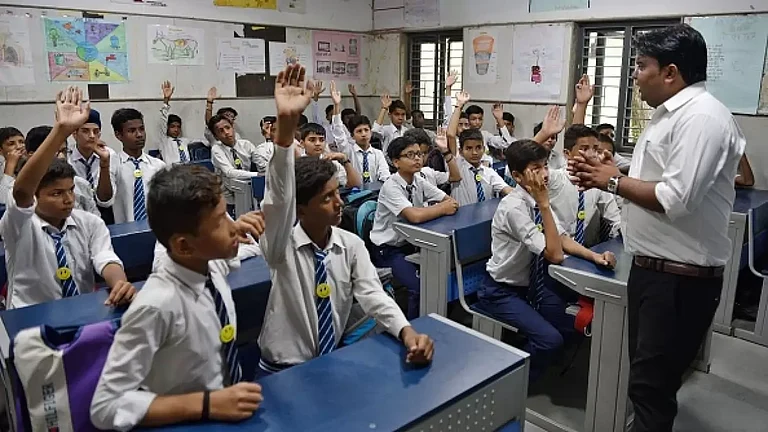"In India, the vote bank politics is also associated with minority appeasement. This means that the political parties disregard the principles of equality of all citizens and give priority to the interests of a minority group."
NCERT Textbook Revision Draws Flak Again, This Time On Secularism And Omission Of Babri Masjid
As Opposition ire grew over the latest changes, NCERT director Dinesh Prasad Saklani justified the omissions saying there was no need to teach students about riots in textbook
This is what students of Class 11 will now be taught about vote bank politics in their NCERT Political Science textbook under the revised curriculum for 2024-25. The phrase “minority appeasement” was not there until last year. The latest revision has stirred yet another controversy around school books.
The above change has been made in a chapter on “secularism” wherein the textbook poses a question on whether welfarism for one section comes at the cost of another. It goes on to answer the question and states, “In theory, there may not be anything wrong with vote bank politics but only when vote bank politics leads to the mobilisation of a social group to vote en masse for a particular candidate or political party during elections, this distorts electoral politics. Here, the important feature is that the whole group works as a single monolithic unit during voting.”
However, until the last academic session, students were taught that if they “think hard” they will find that there is “little evidence” to suggest that vote bank politics favours minorities in the country.
But this is not the only controversial change this year. In the revised Class 12 Political Science textbook, there is no mention of Babri Masjid anymore. The monument which was demolished in 1992 by a Hindu right-wing mob is now reduced to naming it a “three-domed structure”. Furthermore, the section on Ayodhya has also been pruned from four to two pages, deleting several key details from the earlier version and shifting the focus to the Supreme Court judgement that paved the way for Ram temple on the site. Deletions also include BJP's 'rath yatra' from Somnath in Gujarat to Ayodhya, the role of kar sevaks and the President's rule in BJP-ruled states.
As Opposition ire grew over the latest changes, NCERT director Dinesh Prasad Saklani justified the omissions saying there was no need to teach students about riots in textbooks. “Why should we teach students about riots? The purpose is not to create violent, depressed citizens,” he said in an interview with news agency PTI.
Saklani said that there were no attempts to saffronise the curriculum. “All changes in textbooks are based on evidence and facts,” he said.
Criticising it, Congress leader Jairam Ramesh said, "NCERT is mounting an assault on our country's Constitution in whose Preamble secularism features explicitly as a foundational pillar of the Indian republic. Various Supreme Court judgments have clearly held secularism to be an essential part of the basic structure of the Constitution."
TMC leader Saket Gokhale also hit out at the NCERT, questioning the logic behind omitting riots. "By this logic, why teach kids about other 'violent depressing things' like the World War?" he said.
This is not the first of such controversial changes in NCERT textbooks since 2014. With each passing year, the NCERT has faced increased scrutiny for allegedly omitting historical facts and incorporating biased details. Critics have often pointed out that the changes made over the past few years seem to favour the ruling party’s political agenda.
Last October, the Council made headlines after a panel overseeing the development of textbooks in the NCERT, one of 25 such committees, unanimously decided to recommend changing the name “India” to Bharat” in school textbooks. The suggestion had sparked a political controversy, with the Opposition alleging electoral motives. It came in the backdrop of a discussion around changing the country’s name to ‘Bharat’ – which had by then already appeared officially on G20 invites and nameplates of the President and the Prime Minister.
Saklani, however, clarified that "Bharat" and "India" will be used interchangeably in the textbooks as is the case in the country's Constitution. What this indicates is that suggestions are made all the time and are not always accepted and the government has no compulsion of accepting suggestions. However, there is also a bigger picture here.
In the last 10 years, BJP-led governments have also changed the names of towns and other places, such as renaming Allahabad as Prayagraj and Mughalsarai Junction in Uttar Pradesh as Pandit Deen Dayal Upadhyaya Junction. There were also concerns about NCERT panel chief and other members being associated with the RSS, BJP’s ideological sister.
Critics have said time and again that the NCERT textbooks don't capture the nuances of the Mughal period, ignoring the grey streaks to paint an overly favourable picture. The latest omission of Babri only furthers this concern.
Saklani said the tweaks in textbooks are part of the annual revision and should not be a subject of hue and cry. However, it is worth questioning if the best way to “rationalise” the syllabus is by deletion of key historical details or the addition of newer facts. After all, what students read shapes their minds for their future lives and beliefs and the choice to learn and explore should not be dispensable.

